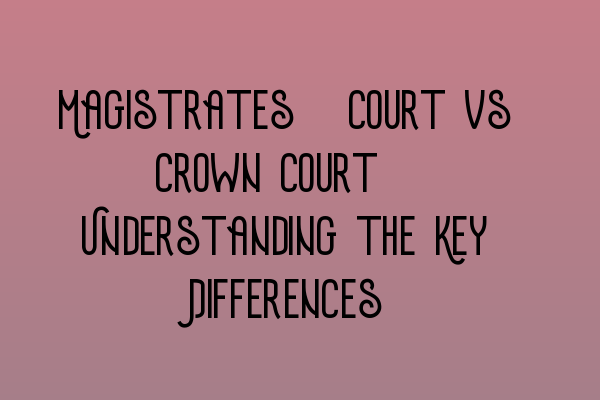Magistrates’ Court vs Crown Court: Understanding the Key Differences
Welcome to the SQE Criminal Law & Practice Law UK blog. In today’s post, we’ll be discussing the key differences between Magistrates’ Court and Crown Court. Understanding these differences is essential for any aspiring solicitor or criminal law practitioner. So, let’s dive right in!
What is Magistrates’ Court?
Magistrates’ Court, also known as the “lower court,” deals with less serious criminal offences such as minor assaults, petty theft, and traffic violations. The court is presided over by a panel of three magistrates, known as lay justices, who are typically not legally qualified. The decisions made in Magistrates’ Court are mainly based on the evidence and information presented in the case.
Related Article: If you’re preparing for the SQE 1 exam, check out our SQE 1 Practice Exam Questions for effective preparation.
What is Crown Court?
Crown Court, on the other hand, is the higher court in the UK legal system. It handles serious criminal offences such as murder, rape, and drug trafficking. Crown Court proceedings involve a judge and a jury of 12 members who are responsible for deciding the defendant’s guilt or innocence based on the evidence presented by the prosecution and the defense.
Related Article: Do you want to assess your knowledge and skills before the SQE 1 exam? Take a look at our SQE 1 Practice Mocks FLK1 FLK2 to boost your confidence.
Key Differences Between Magistrates’ Court and Crown Court
- Jurisdiction: Magistrates’ Court deals with summary offences and some triable either way offences. Crown Court, on the other hand, handles more serious cases that require a full trial with a judge and jury.
- Legal representation: In Magistrates’ Court, defendants can choose between representing themselves or appointing a solicitor or barrister to defend them. In Crown Court, legal representation is almost always necessary, and defendants are usually represented by barristers.
- Sentencing powers: Magistrates’ Court has limited sentencing powers and can only impose sentences for a maximum period of one year or a fine of up to £5,000. Crown Court, on the contrary, has greater sentencing powers, including custodial sentences for more severe crimes.
- Appeals: Decisions made in Magistrates’ Court can be appealed to the Crown Court. Appeals against Crown Court decisions are usually heard by the Court of Appeal (Criminal Division).
Preparation for Criminal Law Practice
If you’re considering a career in criminal law, it’s essential to be well-prepared. Our SQE 2 Preparation Courses are designed to equip you with the necessary knowledge and skills required to succeed in this field. Additionally, our SQE 1 Preparation Courses will help you build a strong foundation in legal principles.
Related Article: Stay updated on the latest SRA SQE exam dates by visiting our website: SRA SQE Exam Dates.
That concludes our discussion on Magistrates’ Court vs Crown Court and their key differences. We hope you found this article informative and gained a clear understanding of the distinctions between these two courts. Be sure to check out our related articles for further preparation resources.
For more legal insights and updates, stay tuned to our SQE Criminal Law & Practice Law UK blog. Thank you for reading!
